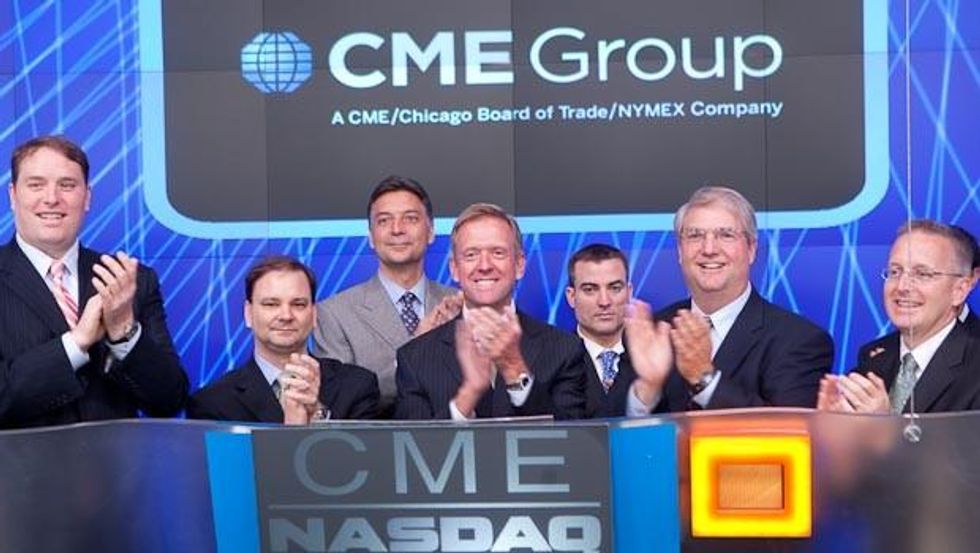Think of powerful, multi-billion dollar corporations, and many come readily to mind. Wal-Mart. General Electric. Exxon Mobil. Bank of America. McDonald's. Apple. We recognize their logos, know what they sell and how to buy it -- or how to not buy it if we choose.
But for all their riches and ubiquity, when it comes to sheer raw power, these high-profile behemoths are eclipsed by a company that most of us have never heard of.
Meet CME Group. Last fall, Forbes revealed "The Four Companies That Control the 147 Companies That Own Everything," in which contributor Brendan Coffey argues that "the real power to control the world" lies not with the likes of Wal-Mart and Bank of America, but with the select few companies that control the indexes that rank these corporations. CME Group, owner of the Dow Jones Indexes, is one of these four companies, which is why it is important for all of us to get to know this company, how it makes its billions, and how it impacts us all.
The "CME" in "CME Group" stands for the Chicago Mercantile Exchange, which has special significance for those of us who live in Chicago. We're familiar with "The Merc" and the Chicago Board of Trade, the two iconic commodities futures exchanges comprising Chicago's Wall Street. (And if you're not from Chicago, you've likely seen the trading floor of Board of Trade -- featured in the classic Ferris Bueller's Day Off). CME Group formed relatively recently, when the Mercantile Exchange bought the Board of Trade in 2007. But a five-year growth and acquisition spree has secured its status as one of the four masters of the corporate universe.
So what does CME Group do, exactly? Maybe the word "derivative" rings a bell. Derivatives are the risky financial products (think credit default swaps) that brought the economy crashing down. The exchanges CME Group operates do handle a few respectable transactions -- farmers protecting their commodities against price fluctuations for example. But mostly, these exchanges operate as giant casinos where thousands of ultra-wealthy traders and speculators go to place bets on the rise and fall of the price of commodities, including oil, gold, currencies, interest rates, and other exotic financial products.
Like more traditional casinos, CME Group makes its money by taking a cut of each and every bet. For a concise explanation of how derivative exchanges work, check out this clip from Trading Places, evidence that the whole set up is comically absurd. Unfortunately, in real life, it's not an audience but the CME that's laughing -- all the way to the bank.
And the CME Group has a LOT to laugh about. A lot of money that is. Its profit margin is consistently above 30 percent, making it the most profitable company in Chicago and one of the most profitable companies in the world. It took home nearly $2 billion last year -- a remarkable figure for a company with just 2,500 employees.
If you think that earning billions in profits year after year would be enough for CME Group, you'd be wrong. Tragically wrong. Because CME Group has a penchant for padding its already expansive bottom line with public dollars.
Chicagoans are familiar with the company's $15 million TIF grab a few years back -- and were justified in claiming victory when, after months of protest by community and labor groups, CME Group took the unprecedented step of giving the money back. And families across the state are now reeling from the Illinois General Assembly's recent decision to reward CME Group's empty threats to relocate with a tax loophole that will take $1 billion out of the state budget over the next ten years, resulting in layoffs and cuts to vital services.
CME Group has a funny way of "earning" money -- and the joke is on the 99%. In addition to siphoning off taxpayer dollars that are desperately needed elsewhere, CME Group is also setting a very troubling example. By taking advantage of people's fears about jobs and the economy to get its hands on public funds, it's sending a message to all other corporations that they, too, can pad their profits, pay their executives multi-million dollar salaries, and hire corporate lobbyists to ensure that the laws continue to favor their company, all with our money.
Although keeping a low profile has helped CME Group become so powerful, over the last few months the company's irresponsible behavior has earned it some unwanted attention. The collapse of its client MF Global, former New Jersey governor John Corzine's derivatives brokerage where $1.6 billion in client funds went missing last October, put CME Group in the spotlight. The CFTC, the federal agency that oversees futures exchanges, is now investigating CME Group to determine whether the company fulfilled its regulatory obligation to safeguard customer money. And just a few days ago, CME Group announced that CEO Craig Donohue would be stepping down much sooner than anticipated, amidst growing trader dissatisfaction with his handling of the MF Global crisis.
Given both its immense power and its history of predatory behavior, we would be wise to keep an eye on CME Group. In the coming weeks and months, Illinois will be grappling with the giant hole that the company's tax breaks have left in the state budget, and families will suffer as a result. There has never been a better time to stand up to this powerful company and demand that it give our money back.




